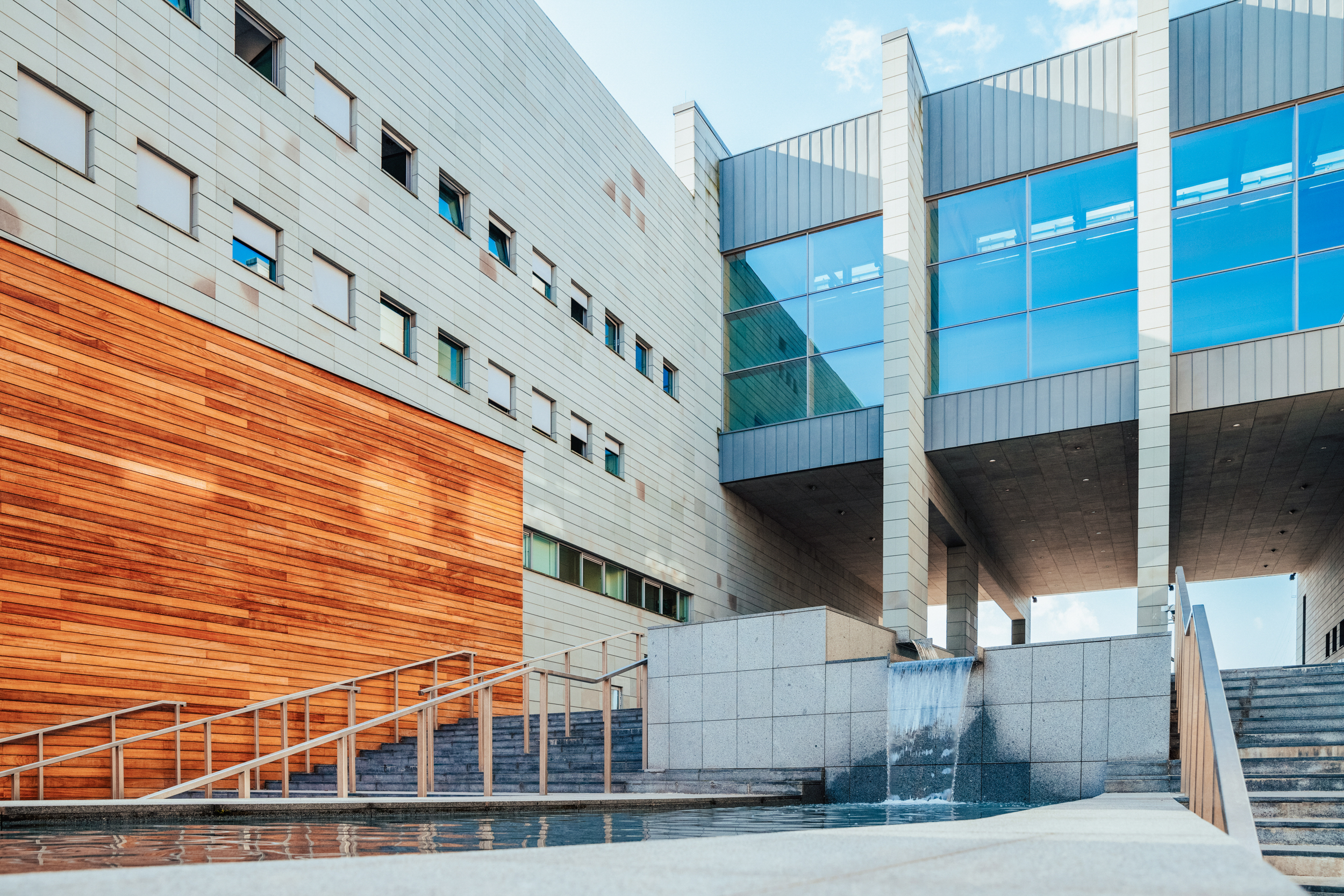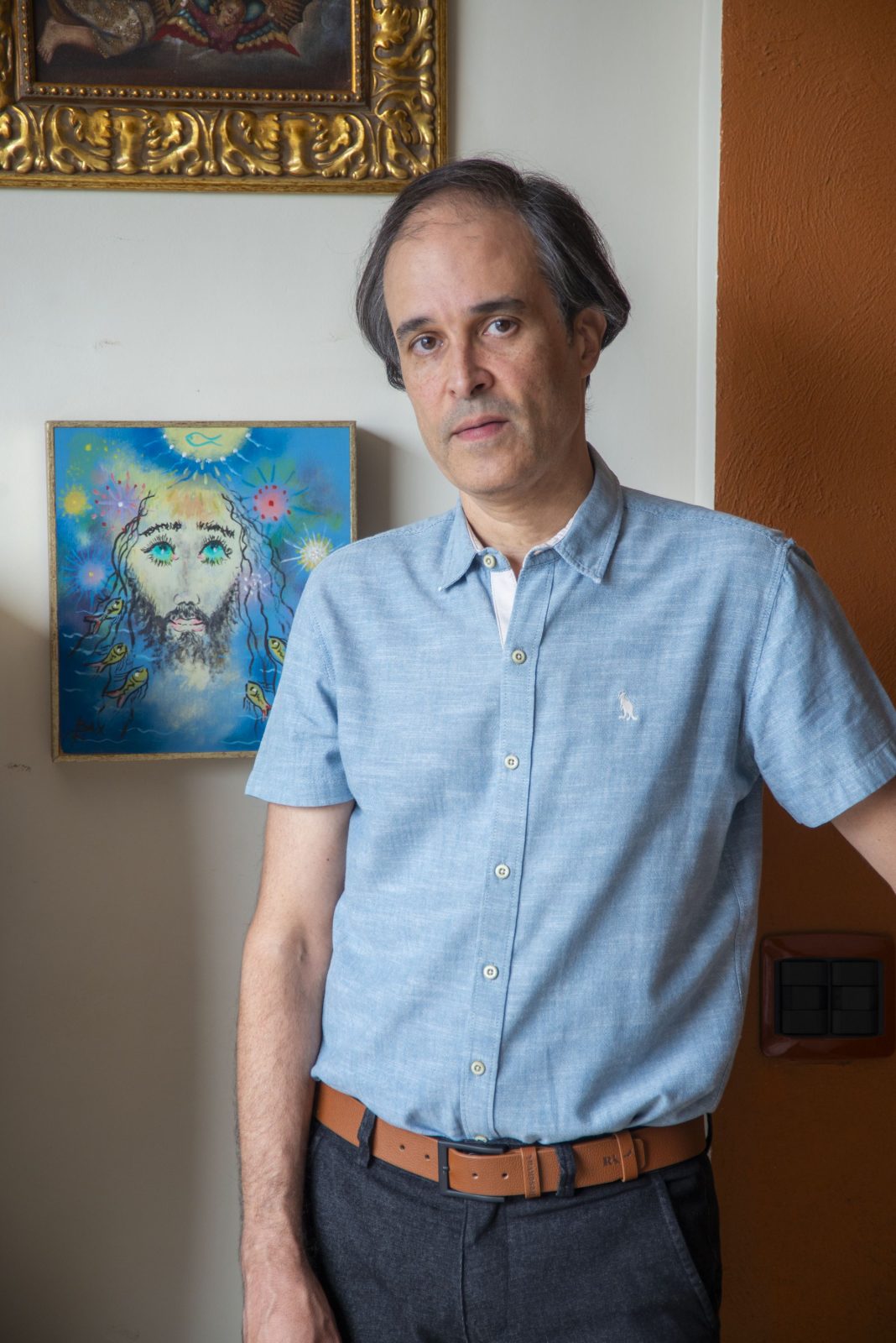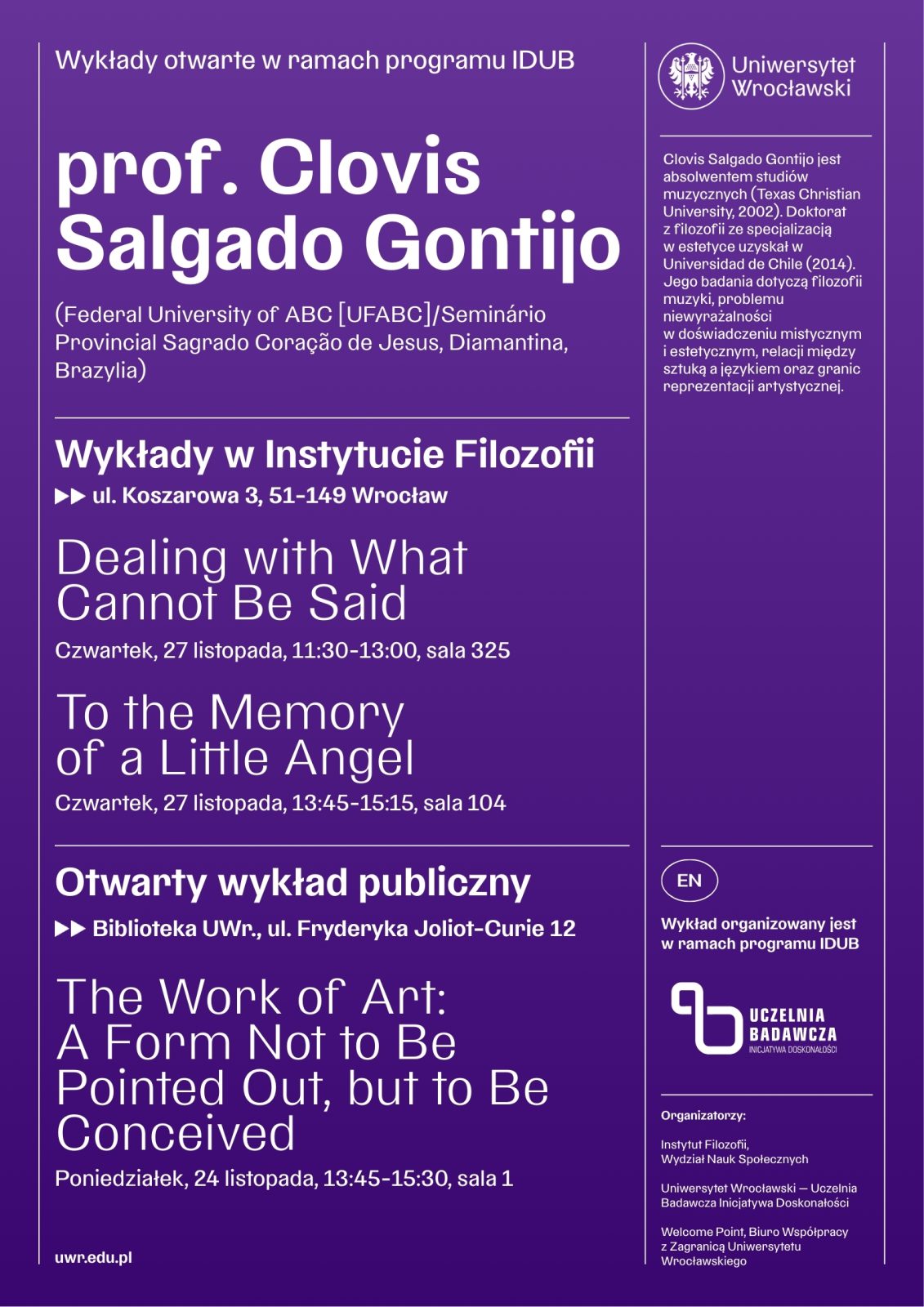
Prof. Clovis Salgado Gontijo visits the UWr Institute of Philosophy
The Institute of Philosophy, Faculty of Social Sciences at the University of Wrocław, will host a visiting professor under the IDUB programme from 24 to 27 November 2025 – prof. Clovis Salgado Gontijo (Federal University of ABC [UFABC] / Seminário Provincial Sagrado Coração de Jesus, Diamantina, Brazil). During his visit, three events will take place: a public lecture at the Library of the University of Wrocław and two workshops/seminars held on the Faculty of Social Sciences campus at ul. Koszarowa.
Below is the programme of events accompanying prof. Clovis Salgado Gontijo’s visit to the University of Wrocław.
- On 24 November (Monday), between 1:45 p.m. and 3:30 p.m., a public lecture entitled The Work of Art: A Form Not to Be Pointed Out, but to Be Conceived will be held at the University Library at ul. Fryderyka Joliot-Curie 12.
About the lecture
The book Problems of Art, published in 1957, brings together ten lectures and an appendix on “Abstraction in Science and Abstraction in Art”, by the American philosopher Susanne K. Langer (1895-1985). As the fruit of her mature reflection on art, the volume presupposes and revisits some of the hypotheses and concepts formulated in her previous works. One of the reexamined concepts is that of the “symbol” –developed by Langer in continuity with Ernst Cassirer’s approach– and its possible application to the work of art. This lecture will relate Langer’s remarks on the “art symbol” and on the “symbol in art”, a distinction clarified in Problems of Art, to a famous pictorial work — The Calling of Saint Matthew (1599-1600) by Caravaggio, one of the three paintings on the life of Saint Matthew that compose the Contarelli Chapel in the church of San Luigi dei Francesi, in Rome. The Calling of Saint Matthew, which features an impressive interplay of hand gestures pointing to different characters in the scene, may help us understand the conceptual and not signific function of the art symbol according to Langer’s semantic and anthropological approach to the philosophy of art. - On 27 November (Thursday), two workshops/seminars will be held at the Institute of Philosophy of the Faculty of Social Sciences at ul. Koszarowa 4: Dealing with What Cannot Be Said (11:30 a.m.–1:00 p.m., room 325) and To the Memory of a Little Angel (1:45–3:15 p.m., room 104).
Dealing with What Cannot Be Said
This lecture will examine – apparently through a paradoxical path, that is, verbally – the theme of the unsayable. At first, some realities and some spheres of human experience before which we recognize the limits of words will be presented, such as death; violence; divinity; mystical, artistic and sensory experiences; the realm of our affections; grace; and human’s interiority. After this overview, it will be necessary to verify whether the verbal treatment of the unsayable is indeed paradoxical, by drawing on Vladimir Jankélévitch’s (1903-1985) distinction between the unspeakable (l’indicible) and the ineffable (l’ineffable), the two antipodean poles of the inexpressible. If a verbal expression of the ineffable, in particular, is still possible, would there be specific strategies for approaching it? Finally, the reflection turns to whether a philosophical analysis of the discursively inexpressible may contribute to the epistemological, linguistic, and aesthetic fields, asserting something beyond the mere unsayability of what cannot be said.
To the Memory of a Little Angel
During the first decades of the 20th century, the Brazilian photographer Chichico Alkmim (1886-1978) portrayed around forty-six photographs of dead infants, the so-called anjinhos (“little angels”) –an international photographic practice at his time. These tender and poignant images may be suggestively placed in dialogue with the philosophy of Vladimir Jankélévitch (1903-1985). Although the latter is quite critical of postmortem portraits and does not focus specifically on photography in his “musical” thought, he occasionally expresses a significant concern with the death of a child. Moreover, some of his key philosophical themes –such as death, irreversibility, nostalgia, innocence, transience and the unspeakable– make Jankélévitch’s philosophy a privileged framework for reflecting on a child’s death and its modes of representation. Despite departing from a past photographic practice, this theme reveals a striking contemporaneity today, when the unspeakability of an infant’s death is intensified by situations of war, urban violence, and forced migrations, calling for a renewed commitment to the memory of the child.
All events will be broadcast online. To participate remotely, please contact us by email at: mariusz.turowski@uwr.edu.pl. A link to the broadcast will be sent in response.
Bio

Clovis Salgado Gontijo holds degrees in both Music and Philosophy. He earned his Master’s in Music from Texas Christian University (2002) and his PhD in Philosophy, with an emphasis on Aesthetics, from the Universidad de Chile (2014). His research is devoted to the philosophy of music, the theme of ineffability in mystical and aesthetic experience, the relationship between the arts and language, and the limits of artistic representation. He is the author of Ressonâncias noturnas: do indizível ao inefável (Loyola, 2017), based on his doctoral dissertation, and of “L” de Diferença (Quixote+Do, 2020). He translated and wrote the forewords for the Brazilian editions of La Musique et l’ineffable by Vladimir Jankélévitch (Perspectiva, 2018), Quelque part dans l’inachevé by Béatrice Berlowitz and Jankélévitch (Perspectiva, 2021), and Problems of Art by Susanne K. Langer (Quixote, 2026). He was a professor and researcher for thirteen years at the Faculdade Jesuíta de Filosofia e Teologia (FAJE) in Belo Horizonte (August 2011 – July 2025). He carried out postdoctoral research at the Università degli Studi di Salerno (September 2024 – May 2025) under the supervision of Professors Daniela Calabrò and Enrica Lisciani-Petrini. A member of the Langer Circle, he is currently a collaborating researcher at the Federal University of ABC (UFABC) and a lecturer at the Seminário Provincial Sagrado Coração de Jesus in Diamantina.

Date of publication: 21.11.2025
Added by: M.K.



